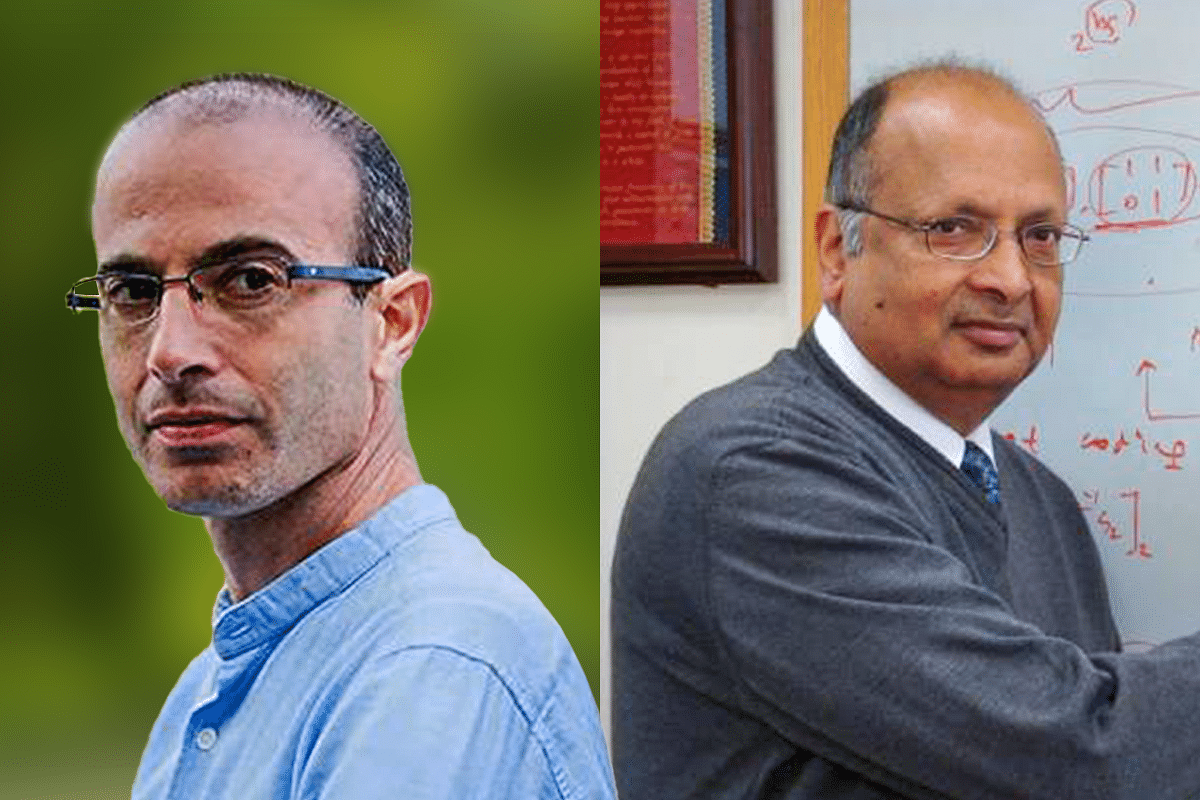Ideas
What Two Leading Global Thinkers Said About AI And India This Week
- AI has many positives and some negatives — but it is coming, says inventor Arogyaswami Paulraj.
- AI could see a new kind of imperialism — data colonialism, warns historian Yuval Noah Harari.
- Both spoke on the promise and perils of AI at different seminars in India this week.

Yuval Noah Harari and Dr Arogyaswami Paulraj.
A world-renowned, Indian-American technologist and an Israel-based thinker and historian, both spoke virtually at separate events in India on Wednesday, on the mixed blessings of artificial intelligence (AI).
Addressing a webinar organised by the India International Centre in Delhi, as part of its diamond jubilee lecture series on Digital Governance, India-born Dr Arogyaswami Paulraj, Professor Emeritus at the Department of Electrical Engineering of Stanford University, US, and inventor of key wireless communication technologies, said AI had many positives and a few negatives — but it could not be wished away.
Banning AI was akin to banning smartphones or the Internet or the commercial jet aircraft — it was not possible. “It requires engagement by society — but we will come out on top. On balance it cannot and must not be ignored — but we must build some guard rails.”
AI offered the hope of significant economic and social benefits for India — increased labour productivity, higher gross domestic product (GDP) growth, better delivery of healthcare, the automation of hazardous or repetitive jobs… But this will be accompanied by job displacements, losses at lower skill levels and gains at higher levels that may not be easy for a society to adjust to.
It could also conceivably lead to increased wealth inequality — between nations, companies and people. AI could be misused for mass population manipulation and polarisation for political purposes — but the way to deal with such downsides was through public debate and the creation of apolitical watchdog bodies, Dr Paulraj said.
Seventy-five years of Independence have seen India achieve a steady 7 per cent growth in GDP and emerge as the fifth-largest carmaker in the world and the source of over 35 per cent of all generic drugs and pharmaceuticals.
It had created a global brand in IT services and pioneered a universal identification system — and AI could help her sustain leadership in all these areas. But for this to happen, India’s share of the global core high-tech sector needed to grow significantly — to say, 5 per cent in the next one or two decades. And making AI work for all citizens was the central challenge, Paulraj suggested.
Dire Warning On ‘Digital Dictatorship’
Also on Wednesday, a somewhat more dire warning note about the downside of high-tech, was sounded at the ongoing NASSCOM Technology & Leadership Forum 2022, by historian Yuval Noah Harari, currently with the Hebrew University of Jerusalem in Israel.
“Big data and AI are the two big problems at national and global levels. The danger on the national level is that a few groups, corporations and even government can monopolize the immense power of data and AI to create an extremely unequal society,” Professor Harari said, in conversation with NITI Aayog chief executive officer, Amitabh Kant.
“This has been the dream of dictators and tyrants throughout history but they were never able to do it because they didn’t have the technology. Now they also have the technology and we need to prevent the rise of this kind of digital dictatorship.”
He painted a scenario, 10 or 20 years ahead, when somebody in China or the US, has the personal records and data of every politician, judge, journalists and military officers — every conversation they had and jokes they told. “It’s no longer an independent country, it’s a data colony.”
“In the 21st century, to conquer a country, you don’t need to send in soldiers, you need to get their data,” Hindu Businessline quotes Dr Harari.
The warning seemed almost prescient, in a week replete with news headlines of the war bugles sounding from the borders of Ukraine, even as that nation says its major banks and defence ministry have come under cyber attack.
Support Swarajya's 50 Ground Reports Project & Sponsor A Story
Every general election Swarajya does a 50 ground reports project.
Aimed only at serious readers and those who appreciate the nuances of political undercurrents, the project provides a sense of India's electoral landscape. As you know, these reports are produced after considerable investment of travel, time and effort on the ground.
This time too we've kicked off the project in style and have covered over 30 constituencies already. If you're someone who appreciates such work and have enjoyed our coverage please consider sponsoring a ground report for just Rs 2999 to Rs 19,999 - it goes a long way in helping us produce more quality reportage.
You can also back this project by becoming a subscriber for as little as Rs 999 - so do click on this links and choose a plan that suits you and back us.
Click below to contribute.
Latest